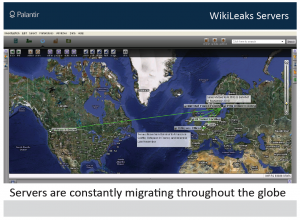The Constitutional Argument Against the Platinum Coin Stunt
 They came for the 4th Amendment, but it was necessary for the war on drugs. They came for the 5th Amendment, but due process had to be sacrificed for the war on terror. They came for the 6th Amendment, but confrontation had to succumb to classification and secrecy. They came for the War Powers Act because Libya was “required to be protected”. Now they are coming for one of the most fundamental of Constitutional checks and balances, the Congressional prerogative of the purse.
They came for the 4th Amendment, but it was necessary for the war on drugs. They came for the 5th Amendment, but due process had to be sacrificed for the war on terror. They came for the 6th Amendment, but confrontation had to succumb to classification and secrecy. They came for the War Powers Act because Libya was “required to be protected”. Now they are coming for one of the most fundamental of Constitutional checks and balances, the Congressional prerogative of the purse.
Who are “they”? They are, of course, the ubiquitous Article II Executive Branch. And they have a never ending thirst for usurping power, all in the name of efficacy. It is always necessary, it is always an emergency, there is always a reason, for them to take the power. They are the Daddy Branch, and it is always best to trust them. So they say.
Back when “they” were the Bush/Cheney regime, liberals, progressives, and Democrats in general, had a seriously dim view of accumulation and usurpation of power in a unitary Executive. When Dick Cheney, David Addington and John Yoo contorted existing law, gave it application never intended, and manufactured legal and governmental gimmickry to accomplish stunningly naked Executive power grabs, those on the left, especially the blogosphere, screamed bloody murder. Well, that is precisely what is afoot here with the Mint the Coin! push.
Where is that principled set of voices on the left now? Things are different when it is your guy in office I guess. Because the active liberal/progressive left I see out there is currently screaming to “Mint the Coin!” doesn’t seem to realize they are calling for the same type of sham rule of law that John Yoo engaged in.. This is most curious, because “Minting the Coin!” contemplates a naked power grab by the Executive Branch of historic proportions. It is a wholesale taking of the Congressional purse prerogative under the Constitution. But, hey, its an “emergency”. Of course. It always is when the Article II Executive Branch comes to feed in the name of efficacy.
What is the value of Separation of Powers, and constriction of Constitutionally assigned powers to the branch to which they were assigned, and what is the value in insuring that an imperial Executive Branch does not usurp too many powers? Let James Madison, in Federalist No. 47 explain:
No political truth is certainly of greater intrinsic value, or is stamped with the authority of more enlightened patrons of liberty, than that on which the objection is founded. The accumulation of all powers, legislative, executive, and judiciary, in the same hands, whether of one, a few, or many, and whether hereditary, selfappointed, or elective, may justly be pronounced the very definition of tyranny. Were the federal Constitution, therefore, really chargeable with the accumulation of power, or with a mixture of powers, having a dangerous tendency to such an accumulation, no further arguments would be necessary to inspire a universal reprobation of the system. I persuade myself, however, that it will be made apparent to every one, that the charge cannot be supported, and that the maxim on which it relies has been totally misconceived and misapplied. In order to form correct ideas on this important subject, it will be proper to investigate the sense in which the preservation of liberty requires that the three great departments of power should be separate and distinct.
….
The constitution of Massachusetts has observed a sufficient though less pointed caution, in expressing this fundamental article of liberty. It declares “that the legislative department shall never exercise the executive and judicial powers, or either of them; the executive shall never exercise the legislative and judicial powers, or either of them; the judicial shall never exercise the legislative and executive powers, or either of them. ” This declaration corresponds precisely with the doctrine of Montesquieu, as it has been explained, and is not in a single point violated by the plan of the convention. It goes no farther than to prohibit any one of the entire departments from exercising the powers of another department (Publius, Federalist 47).
What is the import of the Congressional “Power of the Purse”? As James Madison said in Read more →



